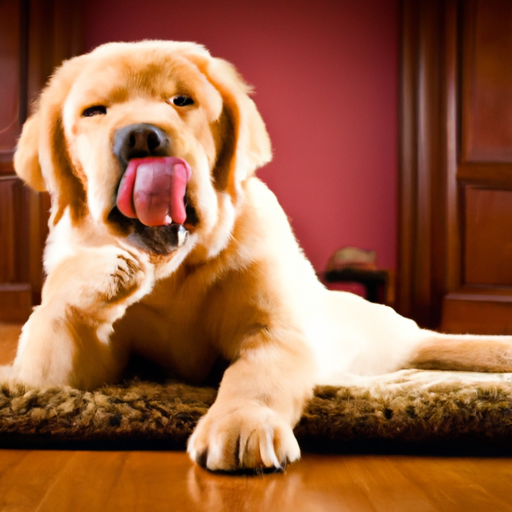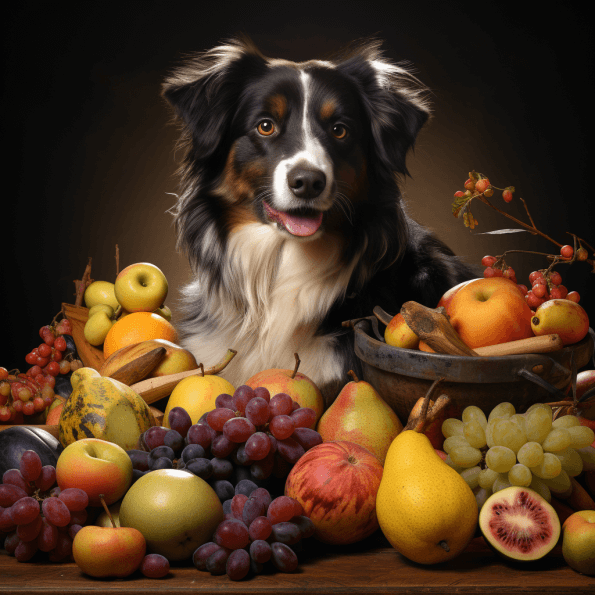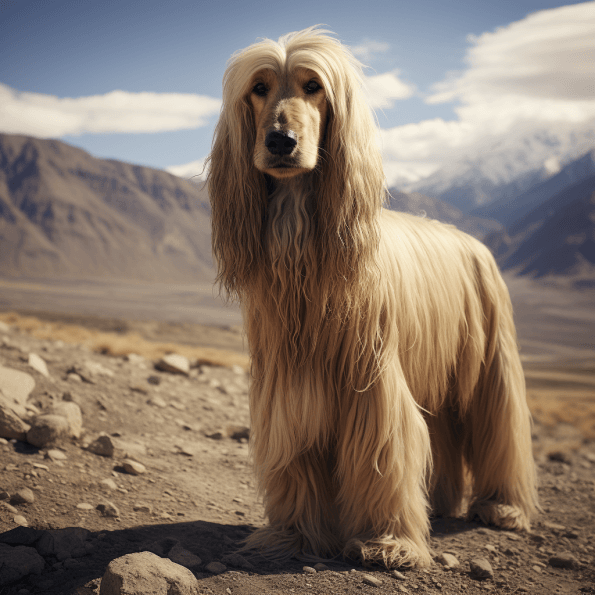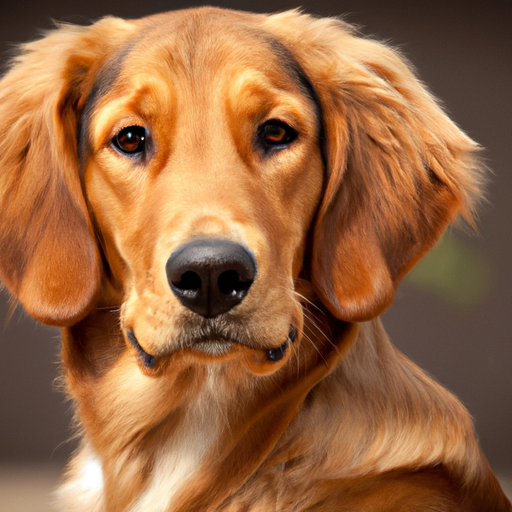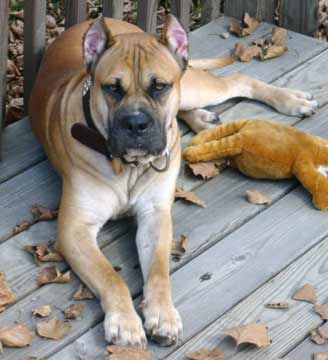Why Do Dogs Lick Their Paws?
In this article, we’re exploring the reasons behind dogs licking their paws. You’ll soon understand the various factors, from health-related to behavioral, that could be causing this common yet intriguing behavior in your furry friends.
Why Do Dogs Lick Their Paws
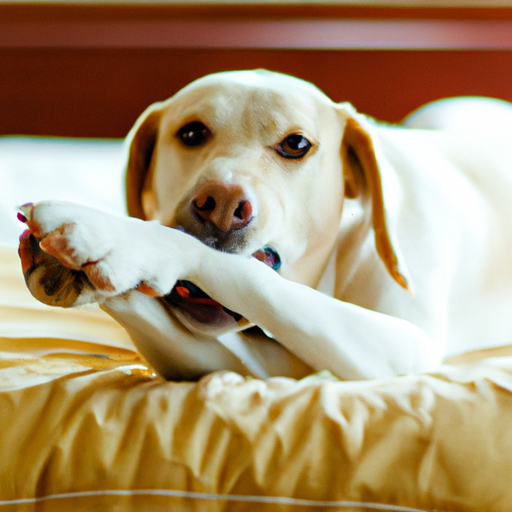
Understanding Dog Paw Licking Behavior
Just as with humans, dogs have behaviors that can tell us a lot about what’s going on in their world and how they’re feeling. Paw licking is a common dog behavior that can have a number of different explanations ranging from harmless to concerning.
The Natural Instinct of Self-Grooming
Dogs are clean creatures by nature, with the ability to self-groom, just like cats. It’s entirely normal to come across your dog licking their paws as part of their grooming routine, much like you would catch them licking other parts of their bodies.
Sign of Boredom or Anxiety
If you notice your dog licking their paws excessively when there’s nothing much going on, it’s possible they might be bored or anxious. Dogs, especially those that are high-energy, require regular mental and physical stimulation to keep them content.
Soothing Mechanism
Like humans, dogs also need to deal with stress, and paw licking is a self-soothing mechanism for some. It’s their version of nail biting, an act they perform to regain a sense of calm.
Common Health-Related Causes of Paw Licking
Health-related issues could also cause your dog to start licking their paws excessively. It’s always crucial to keep an eye on any changes in this behavior, as it could indicate a health issue that’s getting worse.
Allergies and Skin Irritations
Just like humans, dogs can suffer from allergies and skin irritations. If the allergies affect their skin, they may resort to licking or biting their paws to obtain relief.
Paw Injuries and Infections
Dogs can also get cuts, sores, or foreign objects lodged in their paws. This can become uncomfortable and lead to licking until the affliction heals. Bacterial and yeast infections can also cause similar reactions.
Arthritis and Joint Pain
If you have an older dog, the constant licking of their paws could signify arthritis or joint pain. This is a chronic condition that dogs can suffer from – just like humans.
Environmental Factors Leading to Paw Licking
Your dog’s environment can also contribute to why they are excessively licking their paws.
Exposure to Irritants
Certain chemicals like cleaning supplies, lawn fertilizers, or even salt used to melt ice during winter can irritate your dog’s paws, prompting them to lick to relieve discomfort.
Climate and Seasonal Changes
Changes in season and climate conditions, such as dry air in winter or hot pavements in the summer, can lead to paw irritation, which may lead to licking.
Unsuitable Flooring
Flooring that is too hard or rough might also lead to paw discomfort.
Identifying Excessive Paw Licking
Frequency and Duration
Every dog will have a natural routine for grooming, which includes paw licking. However, it becomes a concern when your dog spends significantly more time on this activity or does it more frequently.
Physical Signs on the Paw
You should also regularly inspect your dog’s paws. Persistent licking can lead to sores or changes in their paw’s color and texture.
Changes in the Dog’s Behavior
Your dog may also exhibit other behavioral changes, such as restlessness, loss of appetite, or agitation.
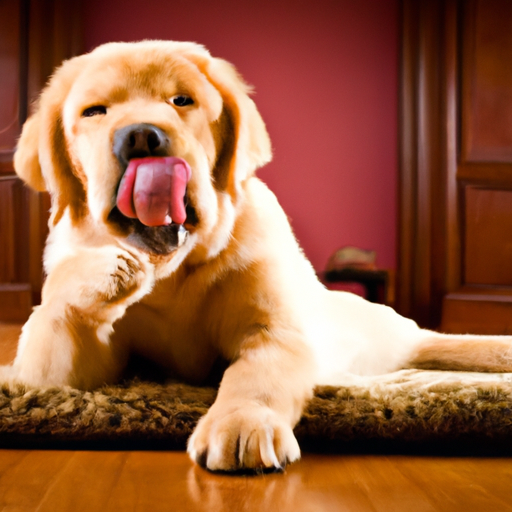
Consulting a Veterinarian
Importance of Professional Diagnosis
Excessive paw licking could be a symptom of various health issues. Thus, it’s vital to consult your veterinarian to get a correct diagnosis.
Typical Diagnosis Procedures
Your vet will likely conduct a thorough physical exam, possibly perform allergy tests, take samples for lab testing, or carry out x-rays to diagnose the core issue.
Possible Treatment Options
Depending on the diagnosis, your vet may suggest various treatments such as medication, allergy shots, changes in diet, or behavior modifications.
Home Management Techniques for Paw Licking
Licking Deterrents
There are various harmless but unpleasant-tasting sprays you can apply to your dog’s paw to deter licking.
Environmental Adjustments
Changing your cleaning supplies, avoiding certain lawn applications, or adding more rugs can help for environmental irritants.
Regular Paw Care
Regularly clean your dog’s paws and check for any debris or minor injuries.
Importance of a Good Diet
Role of Nutrition in Skin Health
A proper diet can affect your dog’s skin health, which in turn can impact paw licking.
Potential Food Allergens
Food allergies can often present as skin irritations. If you notice excessive paw licking, you might try a different diet for your dog.
Recommended Diet Changes
Your vet might recommend specific dog foods or adding supplements like Omega-3 fatty acids to your dog’s diet.
The Role of Mental Health in Paw Licking
Stress and Anxiety as Triggers
Dogs can suffer from stress and anxiety, which can lead to behaviors such as excessive paw licking.
Providing Emotional Support
Provide a safe and calm environment for your dog, with plenty of opportunities for mental stimulation and physical activity.
Mental Stimulation and Exercise
Regular exercise and playtime can help divert your dog’s attention and reduce paw licking.
Prevention of Excessive Paw Licking
Regular Vet Check-ups
Routine vet visits can help detect potential causes of paw licking early on.
Soothing Dog’s Paws
Regularly soaking your dog’s paws in an oatmeal bath or applying coconut oil can soothe irritated paws.
Keeping Living Environment Clean
Keeping your home clean can help minimize foreign substances that may irritate your dog’s paws.
Conclusion: A Multifaceted Approach to Paw Licking
Understanding the Underlying Causes
Determining why your dog is excessively licking their paws is the first step to helping them.
Providing Comprehensive Care
Appropriate care includes both physical health management and ensuring good mental health, as both can influence paw licking behavior.
Importance of Regular Monitoring
Regularly monitor your dog’s behavior and maintain open communication with your vet. Together, you can help keep your furry best friend happy and healthy.

